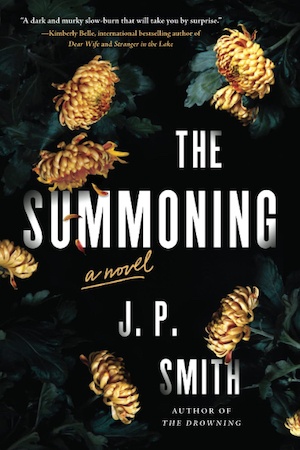
If you like your thrillers to have just a touch of the supernatural then you’ll appreciate what author JP Smith has accomplished in his new psychological thriller, The Summoning.
In the nearly 18 years since her husband died on 9/11, Manhattan resident Kit Capriol has been struggling. Then, three years ago, daughter Zoey suffered a brain injury and has been hospitalised and in a coma ever since. Mother and daughter were waiting on the subway platform when a woman fell in front of an oncoming train. Kit didn’t see exactly what happened, but Zoey may have fainted and hit her head. Was it the blow or what she saw that caused her brain to shut down?
Kit is an actress with some success but only spotty employment. To keep a roof over her head and the medical bills paid, she’s developed a calling that builds on both her tragedies and her acting ability. She helps people connect with the dead. She doesn’t promise anything. She doesn’t tell the future. Her focus is on consolation.
In the beginning, other 9/11 family members were her most frequent clients. Now she scours the obituary pages for memorials that appear on the anniversary of a loved one’s death. “Sorely missed. Still loved. Never forgotten.” That sort of thing. It’s not all grift – she doesn’t charge for a first session. If a client returns, she asks that they leave a donation in a basket by the door. She suggests $100, but it’s up to them. Most do come back, and while Kit’s finances are precarious, she’s hanging on.
Both the nature of her work – not guaranteeing, not predicting – and her payment system keep Kit in somewhat of a legal grey zone. To the extent she researches the client’s lost loved one, finding information online, in obituaries or memorial notices, and uses those tidbits to add to the plausibility of what she reveals, yes, it is a scam. But her purpose is to help the living find peace. And, according to grateful past clients, she’s quite successful.
The NYPD fraud squad know all this, but they are determined to catch her out. They first send a fake client, who is so reassured by Kit’s message that she returns, confesses that the police had put her up to it, and now wants Kit to help her communicate with her real daughter who died as a child.
Kit is a frequent patron at a friendly neighbourhood bar. One night she meets a pleasant, nice-looking man there, a widower, and they have a good conversation, especially when she reveals what she does. Once he leaves, the bartender tells her the guy’s a cop. Kit is intrigued and willing to let that play out. In any case, meeting a man is not her highest priority. She continues going to auditions, hoping for a breakthrough role. She visits her daughter several times a week, talking to her as if she is being listened to, and perhaps she is.
As Kit’s story continues, she is plagued by perturbations in the apartment. Missing items that reappear. The piano playing in the night. The keyboard uncovered. The door she is sure she’d locked found unlocked in the morning. These events coincide with the changing nature of her client sessions. It is as if, after years of pretending, she suddenly does acquire the ability to contact the dead. She’s baffled by visions and voices that aren’t hers or that are a mix of hers and something else. Or are they?
JP Smith does a good job keeping you guessing about the extent to which Kit is or is not manipulating the situation. Although you may be wondering what she’s up to, the direction of the overall plot is pretty clear, and you likely will figure out a few developments that seem to surprise her. The greatest strength of the story is that Kit is such an interesting and likeable character, doing her best in a world that keeps knocking her down. Your ambivalence about the legitimacy, even value of her work, will keep you on your toes. And, there’s some lovely writing.
For something similar try Matt Wesolowski’s Changeling or Charles Salzberg’s Swann’s Down.
Sourcebooks
Print
£12.28
CFL Rating: 3 Stars









